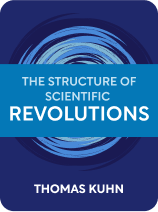

This article is an excerpt from the Shortform book guide to "The Structure Of Scientific Revolutions" by Thomas Kuhn. Shortform has the world's best summaries and analyses of books you should be reading.
Like this article? Sign up for a free trial here .
What are some noteworthy Thomas Kuhn quotes? Which quotes and passages highlight his most influential ideas about the history and philosophy of science?
Thomas Kuhn was an American physicist, historian, and philosopher of science who is best known for his groundbreaking 1962 classic The Structure of Scientific Revolutions. The following Thomas Kuhn quotes encapsulate his revolutionary ideas about the history and philosophy of science.
Here are four Thomas Kuhn quotes and what they mean.
Thomas Kuhn Quotes: The Structure of Scientific Revolutions
“Paradigms are not corrigible by normal science at all. Instead, as we have already seen, normal science ultimately leads only to the recognition of anomalies and to crises. And these are terminated, not by deliberation and interpretation, but by a relatively sudden and unstructured event like the gestalt switch.”
According to Kuhn, paradigm shifts in science do not happen through gradual study or interpretation. Rather, they happen when there is a sudden understanding or change in perception. He likens this process to a gestalt shift in psychology: when your perception of something suddenly changes—like a picture that you can see as either a rabbit or a duck (but never both at once).
“Almost always the men who achieve these fundamental inventions of a new paradigm have been either very young or very new to the field whose paradigm they change. And perhaps that point need not have been made explicit, for obviously these are the men who, being little committed by prior practice to the traditional rules of normal science, are particularly likely to see that those rules no longer define a playable game and to conceive another set that can replace them.”
Any new paradigm starts with one or, at most, a few people. In Kuhn’s view, these people tend to be either young or at least new to the field, which makes them less committed to the current methods and rules, and therefore, less resistant to change than their older colleagues.
“The competition between paradigms is not the sort of battle that can be resolved by proofs.”
According to Kuhn, replacing one paradigm with another is not a matter of proving that the new paradigm is beyond doubt correct. It’s impossible to test a paradigm in every way, under every circumstance. Therefore, many scientists would say that convincing the community to adopt a new paradigm is about showing that, given the available evidence, it is more likely to be correct than the other options.
“Though the world does not change with a change of paradigm, the scientist afterward works in a different world.”
Many will say that what changes with a paradigm is only how scientists interpret their observations, not what they see. In Kuhn’s view, however, a paradigm shift changes everything: the observations made, the data collected, and the conclusions drawn. Given that the observations, data, and interpretations are all different, it seems fair to say that, after a paradigm shift, science is now happening in a different and incommensurable world.

———End of Preview———
Like what you just read? Read the rest of the world's best book summary and analysis of Thomas Kuhn's "The Structure Of Scientific Revolutions" at Shortform .
Here's what you'll find in our full The Structure Of Scientific Revolutions summary :
- How scientific paradigms evolve and become replaced with new paradigms
- Why science is more about figuring out what isn't right
- How throwing out past achievements allows for scientific progress






